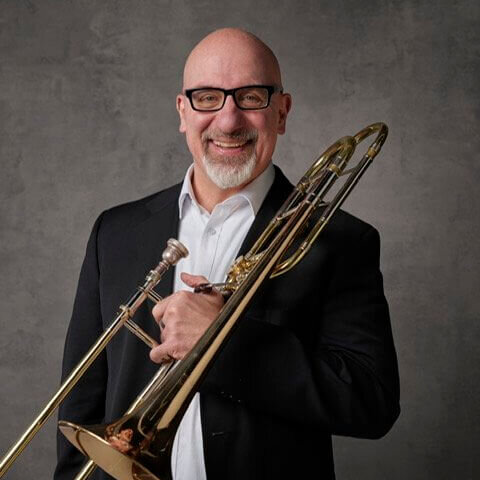by Mike Telin

He has also worked with jazz and commercial ensembles including The Rebirth Brass Band, John Allmark Big Band, the Hot Tamale Brass Band, Manuel Kaufman’s Jazz Orchestra and the Skatch Andersson Orchestra.
On Friday, February 14 at 7:00 pm in Kent State’s Ludwig Recital Hall, Faieta will present a recital of solo works including Leonard Bernstein’s Elegy for Mippy II (1959), Bernard Rands’ Memo 2 (1973), Enrique Crespo’s Improvisation No. 1 (1983), David Felder’s Boxman (1986), and the World Premiere of Marti Epstein’s Abluvion (2022).
As part of the No Exit Presents series, the program will be repeated at 7:00 pm on Friday, February 21 at Heights Arts, and on Friday, February 28 at 7:00 pm at Trinity Cathedral. All performances are free.
Since retiring from teaching, Faieta has rejoined the award-winning Atlantic Brass Quintet — a group he helped found in 1985 — after a fifteen year hiatus. He’s also relocated to Cleveland with his wife and two sons. What is it like to be back on the road? “Of course there have been personal changes, so the first year was a bit different,” he said by telephone from his home in Shaker Heights. “We just got back from Buffalo where we were giving concerts and masterclasses and it’s nice to be playing music and working with people I enjoy.”
Faieta said the biggest challenge of presenting a solo recital is that the program needs to be diverse. “You want to keep the audience looking around the next corner. So you need to choose pieces that stretch the sound and capabilities of the instrument and have the technique to pull it off.”
The program will open with Leonard Bernstein’s Mippy II. “It’s a sweet little tune he wrote as a eulogy for his brother’s beloved dog.”
Bernard Rands’ fifteen-minute Memo 2 was premiered by Miles Anderson at Carnegie Hall in 1978. Writing for The New York Times, Allen Hughes said the work is “full of leaps and florid passagework that might have daunted a coloratura soprano, but not Mr. Anderson. Not only does the piece call for extraordinary agility, but it also requires a lot of extramusical sighing, gasping, gurgling and giggling, all of which were supplied with uninhibited flamboyance.”
Written for Miles Anderson, David Felder’s thirteen-minute Boxman for trombone and electronics was inspired by Japanese novelist Kobo Abe’s novel, in which the lead character is a nameless, homeless person living in Tokyo circa 1960 and experiencing it as a wholly alienating environment.
The trombonist described Marti Epstein’s Abluvion as a minimalist work that will provide a calming moment for the audience.
Faieta noted that trombonist and composer Enrique Crespo spent most of his career in Germany writing music for brass, including Improvisation No. 1. “It’s a piece that will complement the other works on the program.”
Although the trombone may not be the most popular instrument in the world, Faieta said that it is very useful in many musical styles. “Because its sound resembles the human voice, it has the capacity to produce an array of colors. That’s why it’s part of so many bands from Reggae and Ska, to rock groups from the ‘70s and ‘80s.”
What attracted him to the instrument? “I grew up in Lynn, Massachusetts and when I was nine years old a man came to my school and demonstrated all of the instruments. I was completely taken by the sound and the shininess of the saxophone. So I filled out the form and took it home. Well, my mom said ‘you forgot to fill in the name of the instrument.’ I couldn’t remember it so I told her it was the trombone. Over time I learned to love it, and in spite of my silly, stupid mistake, it all worked out.”
Published on ClevelandClassical.com February 13, 2025.
Click here for a printable copy of this article


